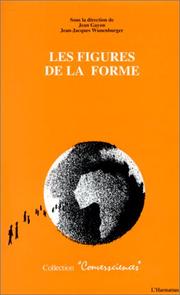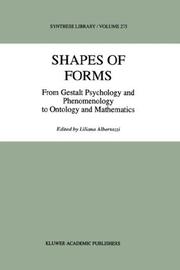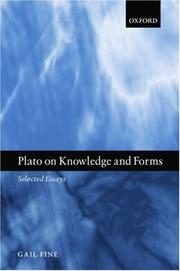| Listing 1 - 4 of 4 |
Sort by
|

ISBN: 2738413137 9782738413130 Year: 1992 Volume: 12 Publisher: Paris: L'Harmattan,
Abstract | Keywords | Export | Availability | Bookmark
 Loading...
Loading...Choose an application
- Reference Manager
- EndNote
- RefWorks (Direct export to RefWorks)
Connaissance [Théorie de la ] --- Epistemologie --- Epistemology --- Epistémologie --- Form (Philosophy) --- Forme (Philosophie) --- Kenleer --- Kennisleer --- Kennistheorie --- Kentheorie --- Knowledge [Theory of ] --- Theorie of knowledge --- Theorievorming --- Théorie de la connaissance --- Vorm (Filosofie) --- Knowledge, Theory of. --- Épistémologie --- Forme (esthétique) --- Forme (philosophie) --- Formes (mathématiques) --- Formes (sociologie) --- Form (Philosophy). --- Épistémologie.
Book
ISBN: 2706817836 9782706817830 Year: 2004 Volume: *2 Publisher: Paris : Maisonneuve & Larose,
Abstract | Keywords | Export | Availability | Bookmark
 Loading...
Loading...Choose an application
- Reference Manager
- EndNote
- RefWorks (Direct export to RefWorks)
Le problème critique de l'élaboration d'une bonne théorie dynamique des formes n'a commencé à être résolu que vers la fin des années 1960 à travers un certain nombre de travaux cruciaux, en particulier ceux de René Thom. Étant donné les relations étroites existant entre le concept de forme et le concept de structure, un structuralisme dynamique a pu ainsi être fondé sur des bases solides. Unifiant des analyses théoriques et des études littéraires qui montrent à quel point la réflexion morphologique est cruciale chez nombre de grands penseurs et artistes, Morphologie et Esthétique explique comment le stucturalisme dynamique entre en résonance avec la philosophie et les arts. Il vise à montrer que de nombreux dispositifs esthétiques édifient une "montée" de la forme sensible vers l'idéalité du sens. La première partie se focalise sur la riche généalogie conduisant de la "Critique de la faculté de juger" de Kant et de la Morphologie de Goethe, avec ses applications à l'art comme dans la célèbre analyse du "Laocoon", jusqu'à des philosophes comme Peirce, Valéry, Husserl, Merleau-Ponty ou Eco et des savants comme D'Arcy Thompson, Turing, Thom, ou Lévi-Strauss. La seconde partie propose quatre études de cas, deux consacrées à Proust (l'une au fonctionnement de la phrase de Vinteuil dans "Un Amour de Swann", l'autre à l'épisode des clochers de Martinville dans "Du côté de Guermantes") et deux autres à Stendhal (l'une à la bataille de Waterloo dans "La Chartreuse de Parme", l'autre à la façon dont ce roman réécrit le mythe d'Eros et de Psyché). Tous les artistes et philosophes ici discutés sont traités comme d'authentiques savants. C'est leur apport théorique exceptionnel qui se trouve mis en lumière dans un hommage de la science à certains phares de l'art.
Form (Aesthetics) --- Form (Philosophy) --- Forme (Esthetique) --- Forme (Philosophie) --- Vorm (Esthetica) --- Vorm (Filosofie) --- Aesthetics --- Literature --- Esthétique --- Littérature --- Forme (Esthétique) --- Philosophy --- History and criticism --- Philosophie --- Histoire et critique --- Goethe, Johann Wolfgang von, --- Proust, Marcel, --- Stendhal, --- Critique et interprétation --- Form (Aesthetics). --- Aesthetics. --- Esthétique --- Littérature --- Forme (Esthétique) --- Critique et interprétation. --- Critique et interprétation --- Aesthetic form --- Idealism --- Matter --- Metaphysics --- Structuralism --- Literature - Aesthetics. --- Forme (esthétique) --- Psychologie de la forme. --- Sémiotique et littérature. --- Structuralisme (littérature)

ISBN: 0792352467 9048150981 9401729905 9780792352464 Year: 1999 Volume: 275 Publisher: Dordrecht ; Boston : Kluwer Academic,
Abstract | Keywords | Export | Availability | Bookmark
 Loading...
Loading...Choose an application
- Reference Manager
- EndNote
- RefWorks (Direct export to RefWorks)
impossible triangle, after apprehension of the perceptively given mode of being of that 'object', the visual system assumes that all three sides touch on all three sides, whereas this happens on only one side. In fact, the sides touch only optically, because they are separate in depth. In Meinong's words, Penrose's triangle has been inserted in an 'objective', or in what we would today call a "cognitive schema". Re-examination of the Graz school's theory, as said, sheds light on several problems concerning the theory of perception, and, as Luccio points out in his contribution to this book, it helps to eliminate a number of over-simplistic commonplaces, such as the identification of the cognitivist notion of 'top down' with Wertheimer's 'von oben unten', and of 'bottom up' with his 'von unten nach oben'. In fact, neither Hochberg's and Gregory's 'concept-driven' perception nor Gibson's 'data-driven' perception coincide with the original conception of the Gestalt.
Form (Philosophy) --- Form discrimination --- Form perception --- Forme (Philosophie) --- Perceptie der vormen --- Perception des formes --- Shape discrimination --- Vorm (Filosofie) --- Vormen--Perceptie --- Vormen--Waarneming --- Knowledge, Theory of --- Gestalt psychology --- Phenomenology --- Ontology --- Mathematics --- Théorie de la connaissance --- Gestaltpsychologie --- Phénoménologie --- Ontologie --- Mathématiques --- Congresses --- Philosophy --- Congrès --- Philosophie --- Forme (philosophie) --- Form perception. --- Théorie de la connaissance --- Phénoménologie --- Mathématiques --- Congrès --- Shape perception --- Perception des formes. --- Idealism --- Matter --- Metaphysics --- Structuralism --- Perception --- Visual perception --- Figure-ground perception --- Philosophy and science. --- Psycholinguistics. --- Language and languages—Philosophy. --- Phenomenology . --- Philosophy of Science. --- Philosophy of Language. --- Phenomenology. --- Philosophy, Modern --- Language, Psychology of --- Language and languages --- Psychology of language --- Speech --- Linguistics --- Psychology --- Thought and thinking --- Science and philosophy --- Science --- Psychological aspects

ISBN: 0199245584 0199245592 9780199245598 Year: 2003 Publisher: Oxford : Clarendon Press,
Abstract | Keywords | Export | Availability | Bookmark
 Loading...
Loading...Choose an application
- Reference Manager
- EndNote
- RefWorks (Direct export to RefWorks)
Plato on Knowledge and Forms brings together a set of connected essays by Gail Fine, in her main area of research since the late 1970s: Plato's metaphysics and epistemology. She discusses central issues in Plato's metaphysics and epistemology, issues concerning the nature and extent of knowledge, and its relation to perception, sensibles, and forms; and issues concerning the nature of forms, such as whether they are universals or particulars, separate or immanent, and whether they are causes. A specially written introduction draws together the themes of the volume, which will reward the attention of anyone interested in Plato or in ancient metaphysics and epistemology.
Connaissance [Théorie de la ] --- Epistemologie --- Epistemology --- Epistémologie --- Form (Philosophy) --- Forme (Philosophie) --- Kenleer --- Kennisleer --- Kennistheorie --- Kentheorie --- Knowledge [Theory of ] --- Theorie of knowledge --- Theorievorming --- Théorie de la connaissance --- Vorm (Filosofie) --- Knowledge, Theory of --- Metaphysics --- Philosophy, Ancient --- Métaphysique --- Philosophie ancienne --- History --- Histoire --- Plato --- Knowledge, Theory of. --- Plato. --- Form (Philosophy). --- Théorie de la connaissance --- Métaphysique --- Theory of knowledge --- Philosophy --- Psychology --- Idealism --- Matter --- Structuralism --- Aflāṭūn --- Aplaton --- Bolatu --- Platon, --- Platonas --- Platone --- Po-la-tʻu --- Pʻŭllatʻo --- Pʻŭllatʻon --- Pʻuratʻon --- Πλάτων --- אפלטון --- פלאטא --- פלאטאן --- פלאטו --- أفلاطون --- 柏拉圖 --- 플라톤 --- Platon --- Platoon --- Платон --- プラトン --- Platon (0427?-0348? av. j.-c.)
| Listing 1 - 4 of 4 |
Sort by
|

 Search
Search Feedback
Feedback About UniCat
About UniCat  Help
Help News
News